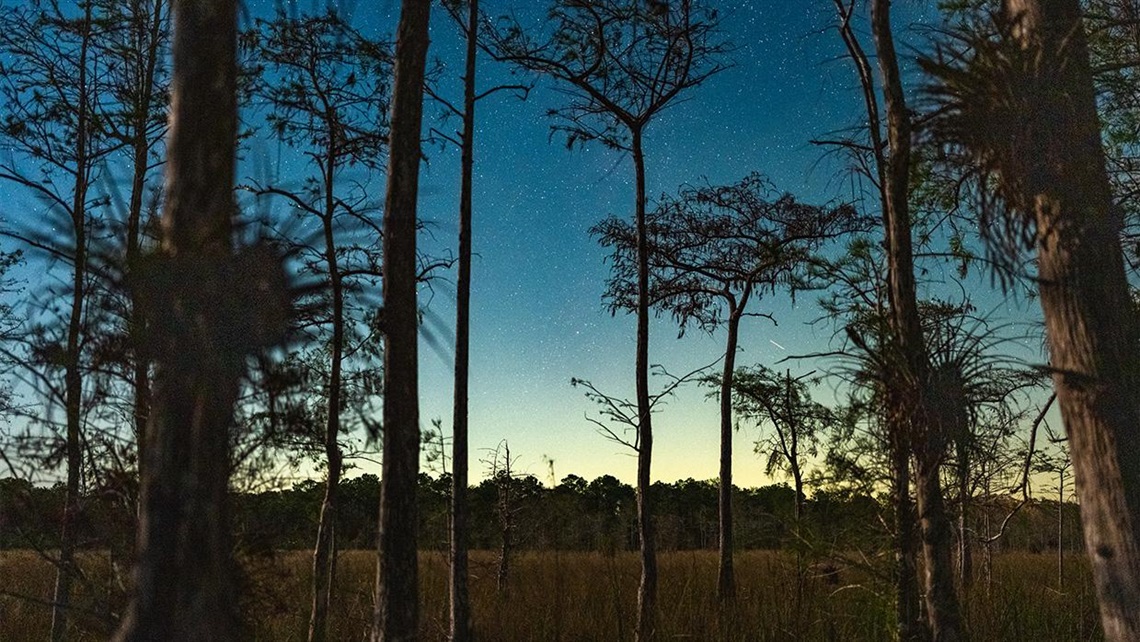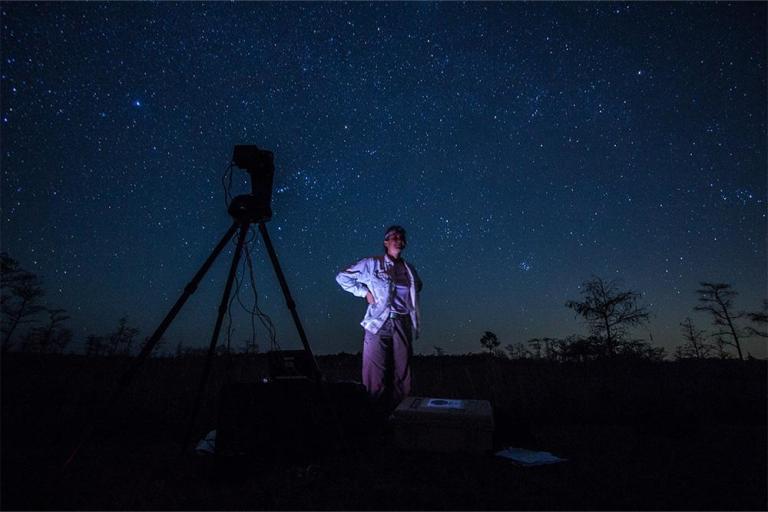The Ultimate Dark Sky Travel Guide

Big Cypress National Preserve covers over 729,000 acres in South Florida, just north of Everglades National Park and about an hour’s drive from downtown Naples. It’s most famous for its fantastic range of biodiversity, home to rare and endangered species like the Florida panther and ghost orchid. The preserve is also known for its unique approach to balancing ecological conservation while maintaining the land’s original use for traditional activities like hunting and off-road recreation.
But the wonders of Big Cypress don’t stop when the sun goes down, especially for astrophiles. You might be surprised to learn that it’s one of the last places in Florida where you can see the Milky Way with the naked eye! In this article, we’ll show you how to get the most out of your stargazing experience, including where to go, what to bring, and other important tips.
Why Big Cypress is Ideal for Stargazing
Big Cypress is home to an increasingly rare phenomenon: true darkness at night. In fact, it’s one of the darkest places east of the Mississippi River, which helped earn it the title of an official International Dark Sky Park in 2016. And that recognition didn’t happen by chance—preserve staff have worked hard to reduce light pollution and protect the sky, not just for visitors who come to stargaze but also for the wildlife that depends on natural darkness.
Though the soft glow from cities like Miami and Naples can still appear along the horizon, Big Cypress—alongside neighboring Everglades National Park—acts as a critical buffer against encroaching light. The result? On a clear night, you’ll see thousands of stars overhead and the bright ribbon of the Milky Way stretching from one end of the sky to the other. It’s a rare opportunity that you’ll have a hard time finding anywhere else!
Burns Lake, February 2014, Big Cypress National Preserve
Best Locations for Dark Skies in Big Cypress
Seagrape Drive near Nathaniel P. Reed Visitor Center
During winter, you can participate in Big Cypress’s ranger-led astronomy programs in this area. These free and public events usually take place once a month from December through March and include constellation tours, telescope viewing, and guided discussions about stars, planets, and deep-sky objects. If the weather doesn’t cooperate, the programs may be moved inside to the visitor center’s auditorium. Curious about what to expect? You can check out photos from recent ranger-led astronomy events here.
Big Cypress Preserve Campgrounds
Are you looking to maximize your dark sky experience in Big Cypress? Why not consider staying the night? The preserve offers eight different campgrounds to choose from—some more primitive than others—each with varying amenities and set-ups. For those whose main objective is stargazing, Monument Lake Campground is probably the most popular choice. Since this campground doesn’t have any electrical hookups, you won’t have to worry about light pollution.
Kirby Storter Roadside Park
Located along the famous Tamiami Trail, Kirby Storter Roadside Park makes a convenient spot to stop for stargazing within Big Cypress. Unfortunately, the boardwalk is closed past 0.3 miles due to a recent fire, but it remains one of the most beautiful places within the reserve to try to spot stars in the night sky!
What to Bring for a Successful Stargazing Experience
You really don’t need a lot to have a successful stargazing experience—mainly just a clear night and a little curiosity. However, here are a few things you can pack that make a big difference:
-
Seating: We highly suggest bringing a portable chair or blanket for an evening of stargazing! After all, comfort is key when you're going to be looking up at the sky for extended periods of time.
-
Red-Light Flashlights: Regular white flashlights can ruin your night vision and affect others nearby. Use a flashlight with a red lens to safely navigate without disturbing the darkness!
-
Bug Protection: Mosquitoes are as much a fixture in South Florida as palm trees. So, we highly advise bringing bug spray. You may also want to consider wearing long sleeves and pants to stay bite-free.
-
Warm Layers: Evenings can cool down quickly. A jacket or warm blanket will help you stay comfortable, especially if you’re staying late or camping overnight.
-
Binoculars or a Telescope: These aren’t required, but they’ll enhance what you can see—especially planets, star clusters, and nebulae. You’re also welcome to bring your own gear if you’re attending a ranger-led program!
-
Extras for Exploring: If you’re moving between locations, make sure your gas tank is full and keep essentials like water, snacks, rain gear, and comfortable shoes in the car.
-
Photography Gear: If you’re hoping to capture some high-quality photos of the night sky, a DSLR with a wide-angle lens is the way to go. You’ll likely also want a tripod and some extra batteries!

NPS Dark Sky Team Sampling, Kirby Storter, March 2014
Other Pro Tips for Stargazing in Big Cypress
Give Your Eyes a Chance to Adapt
After arriving, it will take about 30 minutes for your eyes to adjust to the darkness fully. During this time, try to avoid exposure to bright lights.
Check the Weather Before You Go
You can’t really have a successful night stargazing without clear skies! With this in mind, you’ll want to check the weather forecast and cloud cover before you start making the drive.
Don’t Forget About Wildlife
As mentioned previously, Big Cypress is home to a huge range of wildlife species, many of which are nocturnal. So, during your visit, make sure you maintain a respectful distance, avoid feeding the animals, and are always aware of your surroundings to ensure the safety of both you and the preserve's inhabitants.
Enjoy Your Visit!
Whether you're stretched out at a campsite, leaning against your car on Loop Road, or standing beside a ranger with a telescope, the night sky in Big Cypress is something you won’t want to miss. The quiet out here changes everything. It’s a kind of calm that’s hard to come by, making stargazing in Big Cypress feel so different from anywhere else! To see the night sky the way it was meant to be seen, ONLY Paradise will do.
Learn more about Big Cypress' incredible dark skies and download a free poster to bring the night sky home.